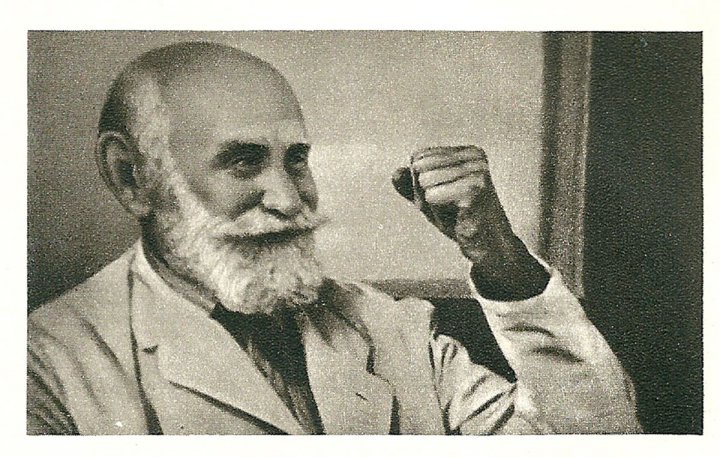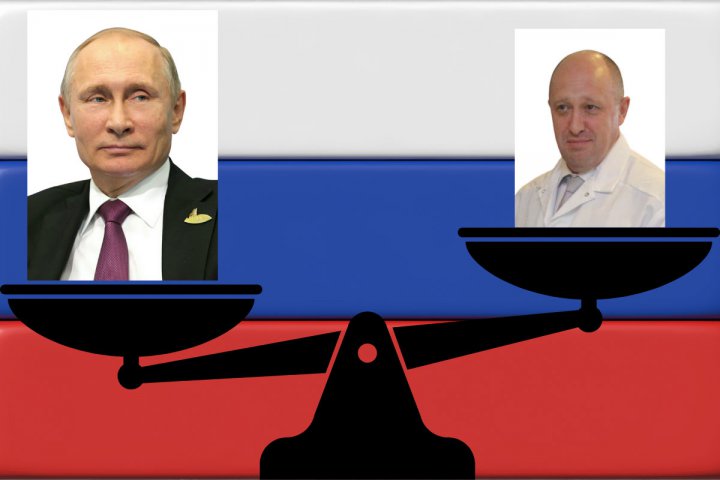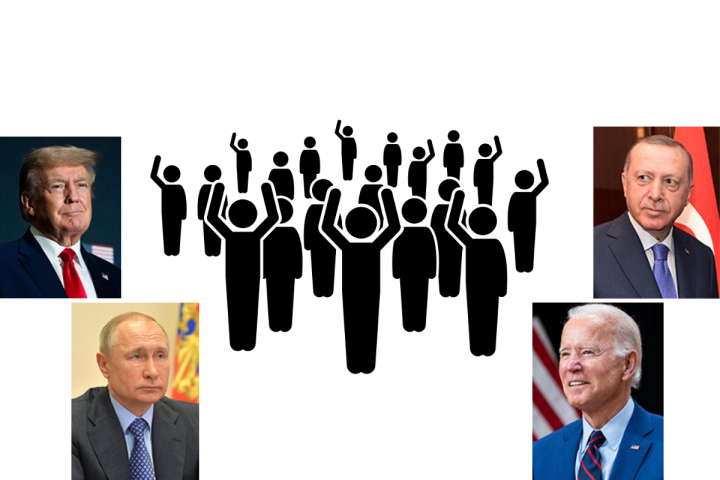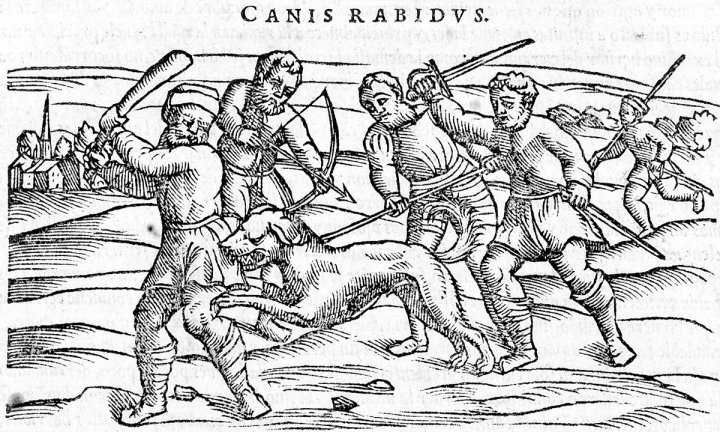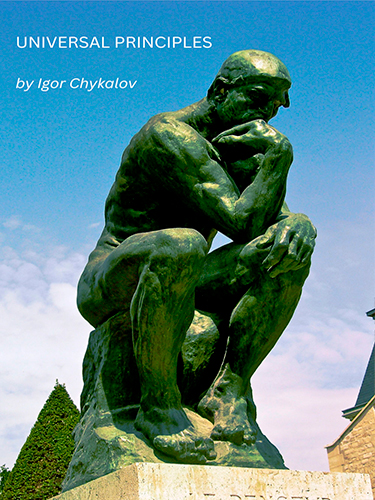Mystifying Russian Soul. Russian Scientist I. Pavlov on Russian Mind (1918)
Russia cannot be understood by mind.
Its mind is blind, its word misleads.
It always keeps its bandit kind.
You have to look at Russia’s deeds.
Its mind is blind, its word misleads.
It always keeps its bandit kind.
You have to look at Russia’s deeds.
“Russia cannot be understood by mind” is a phrase from a famous quatrain by Fyodor Tyutchev, a 19th century Russian poet.
The original in a good translation by John Dewey goes like this:
«Who would grasp Russia with the mind?
For her no yardstick was created:
Her soul is of a special kind,
By faith alone appreciated.»
Many people (including the Russians) and countries believed in Russia and paid a high price for their blind faith, so I have changed the quatrain. I suggest «to look at Russia’s deeds», not just trusting its words, then everything becomes clear. The words of any person (and the state, too) come from the mind which perceives reality mainly through vision. Reality has a lot of aspects. To see them all correctly you need time and honesty.
Mr. Putin is without exaggeration the mind of Russia for the last 20 years or so. He sees everything in a very special way and since the voice of elite is the voice of the entire nation, the Russia's viewpoint on almost any event in the world is usually opposite to what many other people and countries see.
For example, the recent mass shooting in Crocus City Hall in the Moscow suburb was qualified as a "terrorist act" by the Russian court, but Russia's 2-year-long war in Ukraine with Russian missile attacks on Ukrainian civilians and infrastructure is seen by the Russian mind as a liberation of Ukraine from mythical "neo-Nazis" and is called a "special military operation". This is obviously a biased point of view.
And so it is almost about everything. Russian people have their own separate, special vision of the truth, and this vision they present as the only correct one. Many nations often perceive Russia's statements as lies, but the Russians claim this is pure truth, accuse everyone of "russophobia" and try to impose their point of view on other countries by any (economic and even military as in the case of Ukraine) methods.
What then is the truth for Russians, the "Russian mind" in general and where does its special vision come from?
……….
I rarely translate other people’s materials, but I found I had collected a few nice articles by different Russian authors from different time periods specifically about the “mysterious Russian soul” (this can also be called the mentality or worldview of the nation) and I keep sharing them here.
This is the second article in a series «Mystifying Russian Soul».
I give here a translation of a series of lectures by the great Russian scientist I. P. Pavlov “On the mind in general, on the Russian mind in particular”. Academician Pavlov was and still is considered an unquestioned authority in the field of practical neurology and physiology in Russia and in the entire world.
In April - May 1918, I. P. Pavlov gave three lectures which were usually united by the common conventional title "On the mind in general, on the Russian mind in particular". In the personal fund of I. Pavlov, kept by the St. Petersburg branch of the Archive of the Russian Academy of Sciences, there are written records of all three lectures, made by an unknown listener and transcribed by S. Pavlova, the scientist's wife.
I found the lectures here. They were presented by ImWerden, a non-commercial organization in 2009. The lectures are lengthy, so I am giving the translation as an outline. I have also added subheadings throughout the text for ease of reading.
……….
On the Mind in General, on the Russian Mind in Particular
I. Pavlov
April-May 1918
The motive of my lecture is the fulfillment of one great commandment entrusted by the classical world to subsequent humanity. This commandment is as true as reality is and at the same time it is comprehensive. This commandment is very short, it consists of two words: “Know thyself”.
If I believe that I have an exceptional talent for singing and start treating my friends with arias and romances, it will be just funny. But if all the people in their main lower mass not far having been removed from the slave state, and the intelligentsia which only borrowed someone else’s culture for the most part, and not always successfully, and the nation as a whole, which contributed relatively little of its own both to general culture and science, if such people imagine they are the vanguard of humanity and begin to provide examples of new cultural forms to other nations - then we are facing fatal events that may threaten this nation with the loss of its political independence.
In fulfillment of the classical commandment, it is my duty to attempt to give some material to characterize the Russian mind. It seems to me that I have some right on this subject.
____________________________________________________________________
On the Russian Mind.
Ladies and gentlemen!
Please forgive me in advance that in the oppressive times we are all experiencing, I am about to talk about rather sad things. We must have one need, one duty to guard the only dignity left to us: to look at ourselves and our surroundings without self-deception. Motivated by that, I felt it as my duty and allowed myself to draw your attention to my life impressions and observations about our Russian mind.
Mind is such a huge, nebulous topic! What do I begin with?
I have settled on one kind of mind, the natural scientific mind. The main task of the mind is to see the reality correctly, to cognize it clearly and accurately. Then I turned to how this mind works. The correctness, the expediency of the mind's work is, of course, verified by the results of that work. If the mind works badly, shoots wide, it is clear that there will be no good results.
……….
(The ideal natural scientific mind - I.C.)
We can make a precise notion of those properties and techniques which a proper, acting mind possesses. I have identified eight such general traits and techniques of the mind, which I will list today specifically in application to the Russian mind. What from the Russian mind shall I take for comparison with the ideal natural scientific mind?
Here, of course, several types of mind clearly appear.
……….
(What type of mind determines the fortune of a nation? - I.C.)
First, the scientific Russian mind involved in the development of Russian science. It is a kind of «hothouse plant» mind, working in a special environment. Its work is far from the work of the mind that operates in life. The characterization of this mind can only tell something about the mental capabilities of the nation.
This mind has to do with a very small portion of the people, and it could not characterize the people's mind as a whole. The number of scientists, especially in backward countries, is very small. According to the statistics of an American astronomer, our Russian productivity is negligible. It is several tens of times less than the productivity of the advanced cultured countries of Europe.
Then, the scientific mind has relatively little influence on life and history. History, on the other hand, has proceeded outside of scientific influence, it has been determined by the work of another mind, and the fortune of the state does not depend on the scientific mind. Therefore, I will not take into consideration the scientific mind.
……….
But what type of mind will I use then? Obviously, the mass mind, which determines the fortune of the people, but the mass mind will have to be subdivided.
It is, first, the mind of the lower mass and then the mind of the intelligentsia. It seems to me that if we talk about the mind that determines the fortune of the people, the mind of the lower mass will have to be left aside. Let us look at Russian mass mind, i.e. mostly peasant mind (the lecture was delivered in 1918 - I.C.). There is the same ignorance as it was hundreds of years ago. When the soldiers were returning from the Turkish front, the authorities wanted to quarantine them because of the danger of plague. The soldiers didn't agree to that: "We don't care about this quarantine, it's all bourgeois fabrications.”
Is such a mind worth talking about, and can any responsibility be laid upon it?
……….
So the mind which is worth talking about in defining the essence of the future is, of course, the mind of the intelligentsia. It seems to me that what
has happened in Russia now (October Revolution or October Coup – I.C.) is, of course, the work of the intellectual mind, while the masses played a completely passive role, they perceived the direction that the intelligentsia guided them to. I believe, it would be unjust to deny that. The progressive thought was not so much concerned with educating and cultivating the people as with revolutionizing them.
I think, you and I are educated enough to recognize that what has happened was not an accident, but had its tangible causes and those causes were in us. So how will I address this intellectual mind with the criteria I have established for the scientific mind? Will it be expedient and just?
The only difference is: the scientific mind deals with a small piece of reality while the ordinary mind deals with the wholeness of life. The task is essentially the same, but more complex. If certain qualities are required from the scientific mind, they are required from the “living” mind to an even greater extent. Because if we are to blame for what is happening now the responsibility is enormous.
Thus, it seems to me that I can turn to the intellectual mind and see how far it is from those traits which the scientific mind needs for fruitful work.
……….
(1 trait of the ideal natural scientific mind — I.C.)
The first trait of the mind that I have identified was an extreme concentration of thought, a desire to stick to a question, to stick to it for days, weeks, months, years, and in some cases for a lifetime. How is the Russian mind in this regard? It seems to me that we are not inclined to concentration, we do not like it, we even have a negative attitude towards it.
Let's take a look at our arguments. They are extremely vague, we very soon drift away from the main topic. That's our trait. A topic is being put up for discussion and at first no one is willing to speak. But then one voice sounds and after that everyone wants to speak, to speak without any use. There are endless remarks, which take more time than the main subject, and our conversations grow like a snowball. And we end up confusing the issue instead of a solution.
Obviously, our recommended traits are not concentration, but onslaught and swiftness on the fly. This, obviously, is considered as a sign of talent; painstaking and diligence for us poorly fit with the idea of talent. Meanwhile, for a real mind, this thoughtfulness, stopping on one subject is a normal thing.
How many times I have come across such a fact. One of us develops a certain area of science and every time he reports on his work. And the public reacts: "Oh, here is the one! He's all about his own." Even if it's a big and important field of science. No, we're bored, we want new things. Take a look at men of genius. They say they see no difference between themselves and other people except for one trait: they can concentrate on a certain thought like nobody else. And then it is clear that this concentration is strength, and mobility, running thoughts is weakness.
……….
(2 trait — I.C.)
Ladies and gentlemen!
The second technique of the mind is the urge of thought to come into direct communication with reality, bypassing all partitions and signals. We know that all our works depend on the right methodology. Incorrect methodology is when the signals incorrectly transmit the reality, so you get the wrong facts. Of course, methodology for the scientific mind is only the first mediator. It is followed by another mediator - the word.
The word is also a signal, it can be appropriate and inappropriate, accurate and inaccurate. I can give you a vivid example. Natural scientists who did a lot of work themselves found giving the lectures about what they hadn’t done themselves extremely difficult. So there is a huge difference between what you did yourself and what you knew from writing of others. It's embarrassing to lecture about something you haven't seen or done yourself. Let’s see how the Russian intellectual mind works in this respect.
I lecture in physiology, a practical science. All my lectures consist of demonstrations. And what you think! How many times I have appealed to my audience that I didn't lecture the physiology to them, I showed it. If I would just speak they could read it from a book! But I show them the facts they won't see in a book! Just make notes after the lecture of what you have seen. And almost no one has ever followed my advice.
You see that Russian mind is not attracted to the facts. It likes words more and operates with them. Physiology as a science is based on other scientific disciplines. Physiologist at every step has to deal with the elements of physics, chemistry. And my long teaching experience has shown that young people who started studying physiology had no real idea of the elements of physics and chemistry.
Thus, gentlemen, you see that Russian thought does not apply criticism of method at all, it does not like to look at true reality. We are engaged in the collection of words, not in the study of life. This is a common, characteristic trait of the Russian mind. If the mind writes various algebraic formulas and does not know how to apply them to life, why do you think it speaks words and understands them?
Take a look at the Russian public that attends the debates. It is a common thing that the people clap with equal passion to those who speak "for" and those who speak "against". Does this indicate the understanding? After all, there is only one truth because the reality cannot be both white and black at the same time. What do you approve in both cases? It’s a beautiful verbal gymnastics, fireworks of words.
Take another fact. It is the fact of rumor spreading. A serious person reports a serious thing. After all, he reports facts, not words, but then he has to give a guarantee that his words actually follow the facts. There is no such thing. We know, of course, that everyone has a weakness to sensationalize, everyone likes to add something, but still, criticism and verification sometime is needed. And we don't have that. We are mainly interested in and operate with words, not caring much about the reality.
……….
(3 trait — I.C.)
Let's move on to the next trait of the mind. It is absolute freedom of thought, a freedom that goes so far that the one dares to reject what is established in science as immutable. If I do not have that courage, I will never see the new. Do we have this freedom? It must be said that we do not. Are not our representatives in the State Duma enemies of each other? They are not political opponents, they are enemies. As soon as someone speaks in the different way, they immediately assume some dirty motives, bribery, etc.
Is that freedom?
……….
(4 trait — I.C.)
The next property of the mind is the attachment of thought to the idea you have settled on. If there is no attachment, there is no energy, no success. But then the critical moment comes. You have given birth to an idea, but you have to be impartial. And if anything turns out to be against your idea, you have to give it up. So the attachment which is linked to absolute impartiality is the next trait of the mind. And many experiments answer the question: is your idea dead or has it survived?
Let’s see where we are in this regard. We have this attachment. There are many who stay with a certain idea. But absolute impartiality - we don't have it. We are deaf to objections, not only from those who think differently, but also from reality.
……….
(5 trait — I.C.)
The next, fifth trait is thoroughness, the detailed thought.
What is reality? It is the embodiment of various conditions, degree, measure, weight, number. There is no reality out of that. Just remember how Neptune was discovered. When they calculated the motion of Uranus, they found out that there was something missing in the numbers, they decided that there had to be some other mass that affects the motion of Uranus. And that mass was Neptune. It was all about the detailed thought. It's a basic trait of the mind. And how is that trait doing in the Russian mind? Very bad.
We operate with generalities, we don't want to know either measure or number. We believe that virtue is in pushing to the limit, without considering any conditions. This is our basic trait.
Take an example from the field of education. There is a general provision - we need freedom of education. And we get to the point where there are schools without any discipline. That's the price paid for this generalization. It is clear that it is not virtue, it is not strength.
This is, of course, the greatest mistake. Other nations have grasped this clearly, and they keep freedom and discipline side by side, while we have extremes for the sake of generalization. Freedom and discipline are absolutely equal things. What we call «freedom» is called «irritation» in physiological language, and what is usually called «discipline» physiologically corresponds to the concept of "inhibition". And it turns out that the whole nervous activity is composed of these two processes - irritation and inhibition. And the second one is of even greater importance. Irritation is something chaotic, and inhibition puts this chaoticness into a framework.
……….
(6 trait — I.C.)
The next property of the mind is the urge of scientific thought for simplicity. Simplicity and clarity are the ideal of cognition. You know that in engineering the simplest solution to a problem is also the most valuable. A complex achievement is worthless. In the same way, we know very well that the main sign of a brilliant mind is simplicity. So how do we Russians feel about this attribute?
Many people of different nationalities have passed through my laboratory. A Russian person, I don't know why, does not strive to understand what he sees. He does not ask questions which a foreigner would never allow. I have had both Russians and foreigners at the same time. And while the Russian echoes, not really understanding the point, the foreigner is sure to inquire to the root of the matter.
Actually, our public has a certain urge for the vague and dark. I remember, an interesting report has been done in some scientific society. In the end there were a lot of voices: "Genius!" And one enthusiast was shouting: "Genius, genius, although I understood nothing!" as if this nebula were genius. Where did this attitude to everything incomprehensible come from?
……….
(7 trait — I.C.)
The next property of the mind is the pursuit of truth.
People often spend their whole life in the study of truth. But this pursuit breaks down into two acts. The first is the drive to acquire new truths, curiosity, inquisitiveness. And the other is the urge to return constantly to the truth that has been obtained, to be constantly convinced and to enjoy the fact that what you acquired was really truth and not a mirage. One without the other loses its meaning. If you turn to the young scientist, the scientific embryo, you can clearly see that the desire for truth is in him, but he has no desire for absolute assurance that it is truth. He is happily typing up results and not asking the question whether there is a mistake there. Whereas the scientist is captivated not so much by the fact that it is novelty, but that it is really solid truth. And what about us?
The first thing we have is the desire for novelty, curiosity. It is enough for us to learn something and our interest ends. True lovers of truth admire old truths, it is a process of enjoyment for them. But for us, it is a common truth and it no longer interests us, we forget it, it no longer exists for us. Is that right?
……….
(8 trait — I.C.)
Let us turn to the last property of the mind.
Since the attainment of truth involves great labor and tortures, it is understandable that a person in the end constantly lives in submission to the truth, learns deep humility because he knows what the truth is worth. Is it so with us?
We don't have that, we have the opposite. Take a look at our Slavophiles. What did Russia do for culture at that time? What examples did it show to the world? And people believed that Russia would score off against the rotten West. Where did this pride and confidence come from? Don’t we now read almost every day that we are the vanguard of humanity! And doesn't it show how much we are ignorant of reality, how fantastically we live!
……….
(The ideal natural scientific mind and Russian mind (summary)— I.C.)
I have listed all the traits that characterized a fruitful scientific mind. As you can see, we are on the disadvantageous side regarding to almost every trait. For example, we have curiosity, but we are indifferent to the absoluteness, the immutability of thought. Or in the trait of detailed mind we take generalities instead of specialties. We constantly take the unfavorable line and have no power to follow the main line. It is clear that the result is a mass of discrepancies with the surrounding reality.
Mind is cognition, adaptation to reality. If I do not see the reality, how can I correspond to it? A mess is always inevitable here.
Look at the belief in our revolution. Was there a correspondence, was there a clear vision of reality in those who arranged the revolution during the war? Was there any chance that we could do two enormous things at once, both war and revolution? Why did the Russian people compose the proverb “If you chase two hares, you will catch neither”?
Take our Duma again as an example. As soon as it assembled, it raised public indignation against the government. We all knew that we had a degenerate on the throne and that the government was bad. But you utter incendiary phrases, you raise a storm of indignation, you stir up society. Is that what you want? And so you found yourself facing two things - both war and revolution which you could not do at the same time, and you perished.
Is that a vision of reality?
Take another example. Socialist groups knew what they were doing when they took on army reform. They were always defeated by the armed forces and they considered it their duty to destroy this force. Maybe this idea to destroy the army was not ours, but there was at least a visible expediency in the actions of the socialists.
But how could our military do this? How did they go to different commissions that worked out the rights of a soldier? Was there any correspondence with reality here? Who doesn’t understand that military affairs can only be carried out under exceptional conditions! You are hired for a job where your life hangs by a thread every minute. Only through different conditions and firm discipline a situation can be achieved when a person keeps himself in a certain mood and does his job. Once you occupy him with thoughts about rights, about freedom, then what kind of army can you get? And yet, our military people participated in depravation of the army and destroyed discipline...
……….
(Realize reality and who you are — I.C.)
The characterization I have drawn of the Russian mind is gloomy, and I am aware of this. The picture is grim, but what Russia is going through is also extremely grim. And I said from the very beginning that we cannot say that everything happened without our participation.
Do I enjoy the misfortune of the Russian people? No, there is a vital consideration here. Firstly, it is the duty of our dignity to realize what the reality is. And there is another thing.
We will perhaps lose our political independence, we will fall under the heel of one or another. But we will still live! Therefore, it is useful for our future to have an idea about ourselves. It is important for us to be clearly aware of what we are. You understand that if I was born with a heart defect and I don’t know that I will behave like a healthy person and feel bad soon. I will end my life very early and tragically. If the doctor says that you have a heart defect, but you adapt to this, you can live up to 50 years. So it's always useful to know who I am.
There is also a gratifying point of view.
After all, the mind of animals and humans is a special organ of development. It is most affected by life's influences, and it develops perfectly both the organism of individual and nation. Therefore, even if we have defects, they can be changed. This is a scientific fact. And then my characterization of our people will not be an absolute verdict. We may have hopes, some chances. You may have a nervous system with very weak development of an important inhibitory process, the one that establishes order and measure. And you will observe all the consequences of such poor development. But after some practice and training, the nervous system is improving before our eyes significantly.
This means that despite what happened we still shouldn’t lose hope.
..........
P.S. It seems to me that many people (and nations) should try on everything the great scientist I. Pavlov said about the mind.
Comment
✚ Add comment
